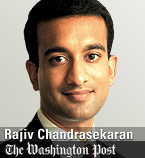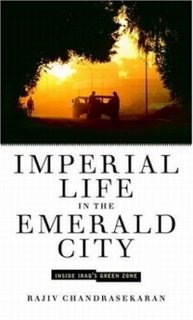From driving an ice cream truck to helping rebuild Iraq's Interior Ministry--an inside story of how monumentally U.S. civilians in Iraq screwed up
>
 There's a pretty good reason why supporters of the Iraq war keep insisting we mustn't look back at the history of our current involvement there (although you'll notice that now that it's become a cliche that there's no good way out, they don't say so much that all that matters is: What do we do now?).
There's a pretty good reason why supporters of the Iraq war keep insisting we mustn't look back at the history of our current involvement there (although you'll notice that now that it's become a cliche that there's no good way out, they don't say so much that all that matters is: What do we do now?).The reason why they don't want us looking back at how we got into the war and how the war and the occupation have been run is that everywhere you look, there are mountains of blame waiting to be apportioned. Not surprisingly, an ample portion of it belongs to those very people who don't want us looking back. (As Paul Krugman pointed out recently, why should we pay any attention to the thoughts on how to get out of the mess from the people who helped get us into it?)
Obviously this is one fundamental reason why it's so important that we do look back, and look back pretty closely. I have another reason, though. I often describe myself as "a nuts 'n' bolts kind of guy." Sure, I like to play with the big conceptual stuff too. But in the end I'm usually most intrigued by "facts on the ground"--i.e., how do/did things actually get done, or not?
Rajiv Chandrasekaran, now an assistant managing editor of the Washington Post, spent 18 months in Iraq reporting for the paper. He has written what sounds like a real "nuts 'n' bolts" kind of book, Imperial Life in the Emerald City: Inside Iraq's Green Zone, focusing on the civilian occupation effort.
He was the guest on last night's Daily Show. Announcing this at the top of the show, Jon Stewart explained:
He is the author of the new book Imperial Life in the Emerald City, a blistering expose on The Wizard of Oz. No, actually it's about life in the Green Zone of Iraq, where our current exit strategy is also a fast clicking of our heels three times.
When interview time came, and Rajiv was brought out, Jon first held the book up.
 JON STEWART: The book is called Imperial Life in the Emerald City: Inside Iraq's Green Zone.
JON STEWART: The book is called Imperial Life in the Emerald City: Inside Iraq's Green Zone.The Americans had a plan when they toppled Saddam Hussein: to take over an area inside Baghdad, wall it off, and to operate the country from inside that bunker. How could that fail to work?
RAJIV CHANDRASEKARAN [laughing]: It was a brilliant plan, right? A seven-square-mile enclave, they could go in there, refill Saddam's swimming pools, set up some bars, a disco, a couple of Chinese restaurants, a cafe, a gymnasium. They'd have Bible study classes, salsa dancing classes. To get around, Halliburton would bring in dozens of Suburbans so they could drive around. Perfect plan.
JON: It seemed like something from Dr. Strangelove, what you describe, this idea of . . . there was this sort of Little America, but not even Little America, sort of like this eccentric city that had no . . . it was like a floating crap game. How did they insulate themselves in that way? Why did they insulate themselves in that way?
RAJIV: They wanted all the comforts of home. You know, Iraq was the big bad world on the outside, and they felt that they were going to this strange place--in fact, half of the people who went to work for the Coalition Provisional Authority, they had to apply for their first passport in order to go to Iraq. And so these guys hadn't been out and about in the world, and so they wanted a little bit of down-home cooking, down-home recreation.
JON: You write this incredible story of the guys who were going to rebuild some infrastructure. They brought three guys. The Germans had accomplished the same task in East Germany, and how many guys did they bring again?
RAJIV: 8000.
JON: Does that speak to the Germans' laziness?
RAJIV: Yes, you know the Germans aren't a very efficient people. They're bloated. We're efficient. We're lean, mean Americans. We're going to do a job that those Germans can do with 8000 with three guys.
JON: How could we be criminally wrong for that long? And it's out in book after book after book, documentation. Why is Halliburton allowed to continue there? Why was the Coalition Provisional Authority allowed to continue there? You write about, in job interviews people were asked who they voted for . . .
RAJIV: It was a real political litmus test. You would have thought, given the challenges of trying to get Iraq back up on its feet, we would have sent the best and the brightest. We sent the loyal and the willing, instead of getting people who were Arabic speakers, or people who had some experience in the Middle East, or in post-conflict reconstruction. Instead they wanted good, loyal Republicans.
So they scoured Republican offices on Capitol Hill, conservative think tanks, and just to make sure that they got them, in the interviews at the Pentagon before they went over, people were asked, "Did you vote for George W. Bush in the 2000 election?" "Are you a member of the Republican Party?" And some, as I detail in the book, were even asked for their views on things like Roe vs. Wade.
JON: I have to tell you, I've read a lot of these books, and I am typically shocked at what I see. This one in particular is Through the Looking Glass. Although my only guess is that they're just over there building a culture of life.
RAJIV: We want life, not death, in Iraq. Maybe that's the prescription for success.
JON: Exactly.
Is this where it all went wrong?
RAJIV: I think this is a big reason it went wrong. You know, we know so well now the disastrous consequences of failing to send enough troops--to protect Iraq, to prevent the looting, to deal with the insurgency in those early months.
What I write in this book is that there was a whole other set of mistakes that were made that are just as responsible for getting us into the mess that we find ourselves in today. And those were the goofs, the mistakes made by the American civilians, who ensconced themselves inside this bubble in the Green Zone.
JON: Who were the adults that were there? Were there adults there? Was it Lord of the Flies? Not even Lord of the Flies . . .
RAJIV: We've gone from extremes. We had these 20-year-old kids in Baghdad, and now we have the octogenarians of the Iraq Study Group helping to lead us along. But you know, seriously, we sent a 24-year-old kid out there who had never worked in the financial industry in this country--out there to reopen the Stock Exchange. We sent a 21-year-old kid who hadn't even graduated from college to join the team rebuilding Iraq's Interior Ministry. I don't have to tell you how important that is. The guy boasted to an interviewer that his most meaningful job before going to Baghdad was as an ice cream truck driver. We took a guy . . .
JON: I do have to take exception here. Everyone does love ice cream.
RAJIV: Iraq's a hot country. Ice cream might have won some hearts and minds.
JON: Have you been able to come down from this? I can see even now your passion and your anger.
RAJIV: Well, you know, this book has been an attempt at some personal closure, from what I witnessed out there 18 months as a reporter for the Washington Post. It was a story there that I felt hadn't been told that I really wanted to get out there, and I think it's important that the American people understand this stuff.
Labels: Rajiv Chandrasekaran



4 Comments:
This is one of the ticking time bombs that will go off sometime after the first of the year. Every time I hear one of the kool-aid drinkers say we shouldn't look back because we need to look forward, I get a little smile. There are soooo many ass about to be set on fire.
If I were one of these twenty-somethings who went over there(and made a fortune) I think I'd be looking for a hole somewhere to crawl in and hope they don't find me.
Be prepared to be floored by the truth.
There are good points in your blog. I would like to supplement them with some information:
I am a 2 tour Vietnam Veteran who recently retired after 36 years of working in the Defense Industrial Complex on many of the weapons systems being used by our forces as we speak.
If you are interested in a view of the inside of the Pentagon procurement process from Vietnam to Iraq please check the posting at my blog entitled, “Odyssey of Armaments”
http://www.rosecoveredglasses.blogspot.com
The Pentagon is a giant, incredibly complex establishment, budgeted in excess of $500B per year. The Rumsfelds, the Administrations and the Congressmen come and go but the real machinery of policy and procurement keeps grinding away, presenting the politicos who arrive with detail and alternatives slanted to perpetuate itself.
How can any newcomer, be he a President, a Congressman or even the Sec. Def. to be - Mr. Gates- understand such complexity, particularly if heretofore he has not had the clearance to get the full details?
Answer- he can’t. Therefore he accepts the alternatives provided by the career establishment that never goes away and he hopes he makes the right choices. Or he is influenced by a lobbyist or two representing companies in his district or special interest groups.
From a practical standpoint, policy and war decisions are made far below the levels of the talking heads who take the heat or the credit for the results.
This situation is unfortunate but it is absolute fact. Take it from one who has been to war and worked in the establishment.
This giant policy making and war machine will eventually come apart and have to be put back together to operate smaller, leaner and on less fuel. But that won’t happen until it hits a brick wall at high speed.
We will then have to run a Volkswagen instead of a Caddy and get along somehow. We better start practicing now and get off our high horse. Our golden aura in the world is beginning to dull from arrogance.
Hey can't give the civilians all the credit. Check out who the Air Force sent over back in 2003 to manage the $17 billion Development Fund for Iraq (DFI).
I have this book on my wish list and am hoping for it.
I have heard it is remarkable. The writing is first rate and the story is unbelievable. It has the rare 5 stars on Amazon.
I personally think every democrat who is taking over a committee chair and planning on investigating Iraq, should be required to read this book first.
Post a Comment
<< Home